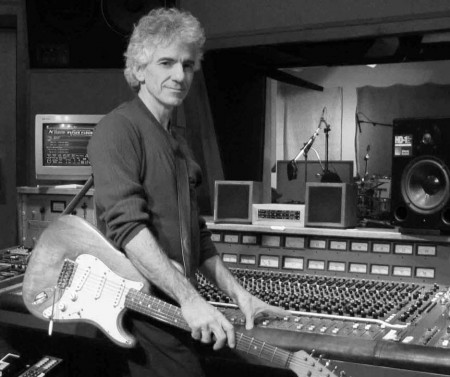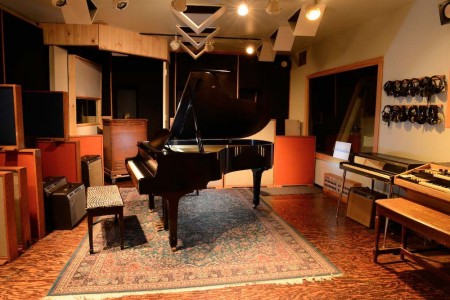A music industry veteran with more than 4 decades of experience, producer/engineer Steve Addabbo has worked on Grammy-winning records and had a hand in launching the careers of Shawn Colvin and Suzanne Vega (including the latter’s worldwide hit “Luka”). He’s also worked on projects the likes of Bobby McFerrin, Olivia Newton-John, Bob Dylan and others. As the owner of Shelter Island Sound in Manhattan, New York, Steve also happens to be one of the Recording Connection’s most noteworthy mentors and loves passing his wisdom and experience on to his students. In a recent conversation with us, Steve had some great things to say about how he got into the business, high points of his career, and insights about the mentoring process. We’ve mined some of the best nuggets of that conversation below. Enjoy!
* * * * *

RC mentor Steve Addabbo
“I was a musician, a guitar player. I had my small, I guess at that time, 4-track system at home. And making that jump to a big recording studio was…I mean, I had no idea how to do it. I mean, I had no idea how to even make that…How do you even get to work in this field? Finally, I had been on the road and I was in my mid to late twenties, I was kinda getting frustrated being away from home. I loved playing, but I felt like I wanted to make records…The band I was with had actually done a session at Hit Factory so I got…We had done some sessions and I was just like, Man, I love being in the studio, and these guys get to go home at night and I’m going off on the road so let me figure out how I can do this. So, I called the engineer up at Hit Factory who we had worked with and I go, ‘How do you get a job there?’ He said, ‘Well, you gotta know something.’ I said, ‘Well, I happen to have an electrical engineering degree and I’m a musician.’ I went down, and they basically hired me on the spot…I basically learned studios from the ground up, how to fix them, how to build them, how to wire them…It was an invaluable experience, those years, working at Hit Factory. Then, I moved over to Sterling Sound and I learned how to maintain a mastering studio and how to cut records, vinyl records. Then I started to put my foot in production and engineering myself, and started working at this little studio called Celestial Sounds where I was kind of trading them my maintenance skills for empty studio time. That’s when I really started to become a producer and learn what I was doing.”
ON THE “GLORY DAYS” OF ANALOG RECORDING, AND WHY HE LIKES THE NEW TECHNOLOGY:
“Having gone through all that, you realize what a nightmare it used to be. The glory days of analog, especially hooking up two 24-track machines at 3 o’clock in the morning, one’s refusing to lock up and…It’s crazy. It was a crazy time, but we got through it and we were able to make records without an undo button, we were able to make records without Auto-Tune, we were able to make records without a grid. How did we do that?…I have no interest in going back, believe me. It’s so much easier now. I’m glad I went there. I’m glad I grew up through it and learned how to record that way. I see a lot of younger people don’t…They really appreciate it, but they don’t really understand it when they’re just faced with the workstation.”
ON WHAT HE’S BEEN WORKING ON IN THE STUDIO:
“The Bob Dylan box set that’s out right now, The Cutting Edge, we mixed the entire thing here all summer. It’s like 450 Bob Dylan takes and outtakes and everything else. It’s gotten great response. In March, a record I did…Well, it’s not really a record, but a recording session I did with Jeff Buckley called “You and I” is now gonna be released. We did it 22 years ago. It’s just Jeff Buckley live in the studio without any production, just him doing whatever the hell he wants. They finally put it together to release it. So that’s another one that’s coming out in March. I’m having a good year right now.”

Live Room in Shelter Island Sound
It definitely trips you out. It’s still intimidating in a way because you’re f**king with history. You don’t want to screw it up, and you want to present it in…You’re not trying to reinvent it, either. I’m not trying to make it better than it was. I’m just trying to present it in a true fashion that sounds good today because if you compare it to the way the records sounded back then, I thought the records were very thin sounding back then. They were very bottom light in the mastering and just the way they mixed it…But it’s pretty trippy being inside those sessions from 1965. It definitely is.”
ON SOME OF THE OTHER HIGH POINTS OF HIS CAREER:
“Working with Lou Reed and Eric Andersen. We did a song, they did a song together, and Eric was one of my early heroes from his Blue River record, which is getting a lot of attention now because there’s this huge exhibit at the National Country Music Hall of Fame and the Nashville Cats…Having Olivia Newton-John walk into your studio is a pretty great moment, too…[Bobby McFerrin,] he’s so freaking talented and he’s so magically musical you can’t help but be joyful in his presence because it’s…He just does it, he hears it.”
ON WHAT HE LOOKS FOR IN AN APPRENTICE:
“I want someone who’s interested in recording real musicians or real instruments. That’s what we do here mostly. We have a great piano, we have a great drum kit, and we pride ourselves in how we record vocals for people and how we make them comfortable. So they see that aspect of it. So kids who are interested in that, interested in quality sonics and interested in how to put performances and records together using everything at our fingertips, analog and digital, that’s the kind of student that will attract, be attractive to me. Someone who has done a little bit of homework, they’re here to learn, so if they don’t know anything that’s fine, too. But it’s just the appreciation of the art of recording and if they’re really interested…You really gotta want to do this. There’s no in-between.”
ON WHY HE MENTORS FOR THE RECORDING CONNECTION:
“To me, it made sense. It was kind of the way that I learned even though I didn’t have a particular mentor…I’ve had the experience of teaching in a classroom, too, and it’s not my favorite way to teach this material. No one taught me. I just kind of had to learn as I go and people, someone showed me…You just start to learn all that stuff, and then as you go you’re really learning on the job. Whereas today with all these freaking music schools all over the place and there’s 20-30 kids in a classroom, and you’re trying to teach kids who have such varying degrees of knowledge and inspiration about what they’re doing…To me, it becomes really not a great way to learn this stuff, and no one teaches this stuff in a classroom. But with the mentoring program, what I liked about the initial idea was that you actually…you’re in there. You’re seeing it happen as it happens…And there’s been some great people who’ve come through….I’ve had people who just are still doing it. One guy opened up his own rehearsal, recording studio. Another guy has a studio over in Long Island City. Some guys learn how to do it just so they can go on to record their own band. I’ve had a lot of good experiences with people. The younger kids seem very respectful of what goes on in this room because it is…There’s a lot of history in this equipment. It’s been making records since 1979, and yet we still have the latest and greatest Pro Tools and utilize everything. So it’s a very powerful situation that we have in this studio…When they’re learning with me, they’re going in there and setting up the kick drum mic and we’re moving it around, and we’re doing this and I’m explaining as we go. A couple of guys, they can basically come in here and do what I do. They’ve learned from the ground up the right way why we do stuff.”
* * * * *





